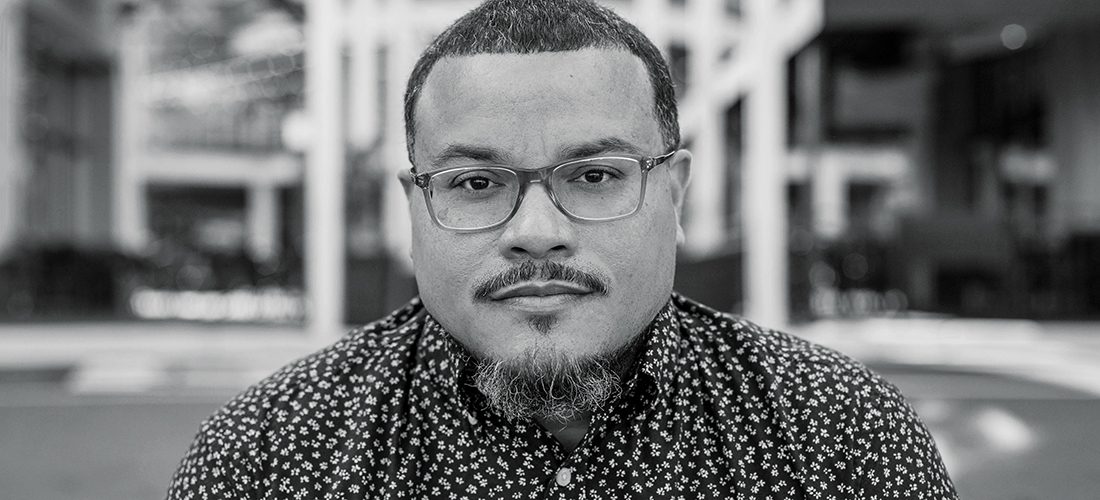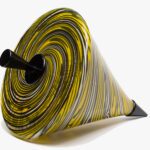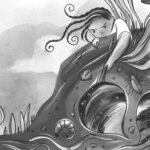Let Jay Ward tell it
June 30, 2022

Charlotte’s first poet laureate talks about his love of the written (and spoken) word and his plans for his new role.
by Page Leggett
Look at this view.
How we get up so high
after being brought so low?
Ain’t we beautiful? Oh yeah,
you got wings, you all got wings.
Just ’cause they forgotten or called
home or cuffed or clipped
or planted like a rooted smile
don’t mean you ain’t
been flying this whole time.
Those soaring words are from “Black Rapture,” the poem Junious “Jay” Ward recited at “Let the Laureate Tell It,” the event in which he was announced as Charlotte’s inaugural poet laureate.
That’s right. As of April, Charlotte joins cities such as Hillsborough and Carrboro, N.C., and Rock Hill, S.C., in having our very own poet laureate.
Ward is a teaching artist and award-winning local slam poet — he was National Slam champion in 2018 — and performer. He won the role after first being selected as one of five finalists and then earning the most votes from a committee of city staff and other cultural leaders.
His first goal for his two-year term? Establish a youth poet laureate. Next, he plans to provide opportunities for other local poets, both performers and “page poets.”
“I really want to close the gap between performance poets and page poets,” he says. “We have both in the city, and they’re both astoundingly good. But I think we have a lot to learn with each other and from each other.”
Ward, whose day job is working as a project manager for a telecommunications company, envisions events and workshops “focused on the art of poetics as opposed to whether or not someone performs or publishes their work.” He’s well-versed in leading workshops. He’s taught them at the local public library, at Hofstra University on Long Island, N.Y., at Kenyon College in Ohio and more.
He doesn’t want to give anything away, but his plans include “activating spaces and acknowledging the amazing poets that we already have in the city and the arts organizations we have — both big and small — that are doing amazing things.”
He cites Blumenthal Performing Arts Center, the Arts & Science Council, the public library, Charlotte Center for Literary Arts, the BOOM Charlotte festival and Goodyear Arts as organizations and projects lifting poets and poetry up in the city.
Ward started writing poetry as an elementary school student in Rich Square, a small town in northeastern North Carolina. He honed his talent through fellowships with Breadloaf Writers Conference, The Frost Place, The Watering Hole and others. He writes of his rural roots, his Black heritage, his family, the burdens of being a man. In “If Being a Man Allowed for Emotion,” he writes:
My mourning is quiet, stealthy like the pause
before bad news. An inherited trait near as I can
tell. All the men in my line are instinctually stoic &
hidden—brackish bodies, damned at the gates.
My last uncle just passed away, also of cancer,
and with my brother Tyrone I discuss this too as inheritance—
annual X-rays to hunt what would prey on us.
In “Homecoming: Rich Square, N.C.,” he writes:
My mother-in-law had never seen
a cotton field up close, this visit
she threw open the door
before I even got to a good stop,
went elbow deep and
picked one tuft clean and good, nervous
the landowner might see her working
his soil and pick up a shotgun,
noticed the blood on her fingers,
rubbed them pink,
and was quiet
the rest of the way home.
His poetry is intelligent, yet easy to access. Performance poetry, he says, is by nature often more accessible than page poetry. You have to be able to “get it” when you first hear it.
To anyone who thinks poetry is impenetrable, Ward has this to say: “If you listen to music, you like poetry. If you watch TV shows that are really well-crafted, you like poetry.”
Poetry is for everyone, and he’s out to demonstrate that during his tenure as poet laureate. For instance, he has a very democratic idea of what makes for good poetry:
A good poem, he says, is one that moves you.
“If you are drawn to it, and if it has impacted and affected you, who am I or anyone else to say that it’s not good?” he asks. “Good is such a subjective word.”
Charlotte’s new chief poetry officer is as humble as he is talented. “I am not silly enough to believe that being a poet laureate makes you the best,” he says as our interview concludes. “We have so many amazing poets — both page and stage — here. I’m just looking for ways to partner, ways to amplify, ways to accelerate. I don’t need to reinvent the wheel; I don’t have to create a bunch of new events. I plan to partner with people and organizations who are already doing great things.” SP
Learn more about Charlotte’s first poet laureate at his website, jwardpoetry.com. Or check out his book of poetry, Sing Me A Lesser Wound.
Photographs courtesy Jay Ward



